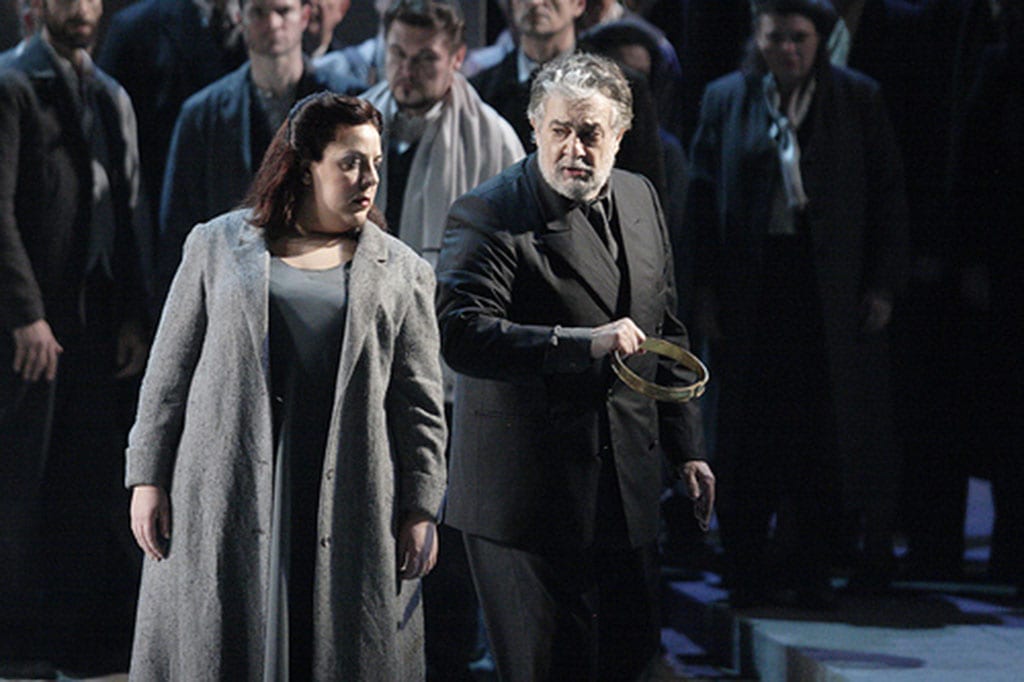Despite not being Verdi’s first opera, Nabucco was the first work to place the composer at the very heart of the Italian — and later international — operatic stage. Composed in 1842, the famous ‘Va pensiero’ has almost become known as Italy’s national anthem despite the fact that it was composed almost two decades before Italy’s political unification in 1861, and the fact that Italy’s official national anthem is actually based on Michele Navaro’s ‘Fratelli d’Italia’ (1847) which continues to be heard in football stadiums around the world, including in this year’s UEFA Euro 2016.
Daniele Abbado’s first revival of the 2013 production of Nabucco at the Royal Opera House successfully animates the plight of the Hebrew slaves imprisoned by the Babylonian army. The ‘grey’ atmosphere of the prison camps, with young boys thrown mercilessly on the fore of the stage, recalls some of the horrific scenes we have recently witnessed in the media of young refugee children swept up onto the Mediterranean shores, hence bringing this biblical story of the libretto by Temistocle Solera very much up-to-date.
Indeed the set, designed by Alison Chitty, is carefully constructed so that this sense of ‘greyness’ permeates all through the opera — a grey backdrop; grey tall tomb-like stones standing on a sandy stage (which eventually get thrown down during the rebellion); and a black-and-white silent film footage projected at the rear of the stage which mimics the main action. Some colour emerges through the use of fire which lights up certain parts of the stage and through the Babylonian curious ‘headquarters’ which is set up to resemble what can only be described as a Mussolini-themed HQ: the large-wired heads placed on stage seem to recall Renato Bertelli’s 1933 futurist sculptures (the ‘Head of Mussolini’), not forgetting the large-wired gigantic body which is ultimately dismantled following the fall of the Babylonians. Whether or not we can draw a parallel, here, between Babylonia in the Old Testament and the rise of Fascism in the twentieth-century is not immediately obvious but it is nonetheless a parallel which gently creeps in during the course of the later acts.
The lead singers make an interesting and somewhat perplexing ensemble. The deep and profound voice of Zaccaria (John Relyea) is sharply juxtaposed against the piercing sound of Abigaille (Liudmyla Monastrska) who sounds smoother when she sings in a lower pitch. The portrayal of the lovers Fenena (Jamie Barton) and Ismaele (Leonardo Capalbo), though present, is nonetheless faint — the affection between the two could have been more naturalistic with fewer melodramatic embraces, however this is redeemed by the singing particularly Capalbo’s clear enunciation, though, very occasionally, it felt as if his words were chasing after the music. And finally the chorus members: though pertinent to the action, their ‘clumpy’ sounds as they take their place on stage at times inevitably gets in the way of the music. But, overall, the singing among all the cast members becomes more confident and consolidated as the opera progresses, particularly by the time of ‘Va pensiero’ and the striking finale.
Above all, what keeps the opera alive is, undoubtedly, Nabucco himself interpreted by the great Dimitri Platanias who, not long ago, was back at the Royal Opera House as Alfio in Mascagni’s Cavalleria rusticana and Toni in Leoncavallo’s Pagliacci. The Greek Baritone dominates the stage with his imperial presence. His powerful voice brings Nabucco to life with zest, passion and vigour. Platanias, together with the magnificent orchestra, invites strong cheers from the audience all around the auditorium, especially when Nabucco is struck down — centre stage and under the spotlight — as he declares himself to be God. The role of Nabucco had been performed earlier this month by the mighty Plàcido Domingo and, though I have not seen the Spanish tenor interpret the title role, Platanias in this performance is very much the star and the saving grace of the entire production.

